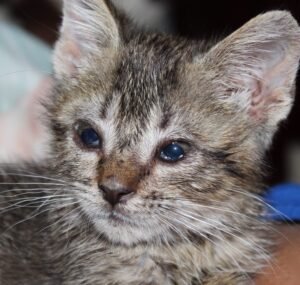Common Disease in Cats ?
As a new cat owner or a regular cat owner, it’s essential to understand the basic care needs and be aware of common health problems and diseases. Cats can suffer from various illnesses, some of which can be dangerous to their health and potentially life-threatening if not addressed. This is why, in this CatsandWoofs article, we will discuss the most common diseases in cats.

Diseases
- Worms: Intestinal worms are a common problem for cats. Roundworms, hookworms, tapeworms, heartworms, and lungworms are frequently seen.
Symptoms: Vomiting, diarrhea, constipation, decreased appetite, pot-bellied appearance, and licking the anus are signs of having worms.
Treatment: Visit the vet for proper diagnosis. - Feline Leukemia: A cancer-causing disease in cats. The virus affects the cat’s immune system, making it more at risk for infections and weakening its natural defense system.
Symptoms: Skin lesions, fever, weight loss, dental problems, loss of appetite, and swelling of the lymph nodes.
Treatment: Support the cat with nutritional food, fluid therapy if dehydrated, appetite stimulation, and veterinary guidance. - Rabies: This disease affects the nervous system, brain, and spinal cord of cats and all mammals, leading to death if not prevented. Symptoms: Uncharacteristic aggression, excitement, excessive production of saliva, and hydrophobia.
Treatment: There’s no treatment after infection; vaccination against rabies from a young age is necessary to prevent the disease.

- Kidney Disease: Studies indicate 1 out of 3 cats suffers from kidney disease. Chronic kidney failure develops over a long period of time, while acute kidney failure is caused by toxins or injury.
Symptoms: Increased thirst and urination, decreased appetite, bad breath, weight loss, weakness, and muscle loss are signs of kidney disease.
Treatment: Veterinary consultation, along with a high-quality protein diet, a consistent supply of fresh water, omega-3 supplements, potassium, and regular monitoring, is recommended. - Allergies: Cats can have allergies caused by cleaning products, perfumes, fleas, fungi, plants, specific foods, or even humans. Symptoms: Sneezing, itchy nose and eyes, skin infections, coughing, vomiting, and diarrhea.
- Otitis: Caused by parasites, fungus, or bacteria, leading to inflammation of the ears, pain, and even hearing loss. Cleaning the cat’s ears regularly is necessary.

- Conjunctivitis: Inflammation of the conjunctiva, the membrane covering the eyes. If not treated in time, it can lead to corneal opacity and vision loss.
- Diabetes.
- Feline Immunodeficiency Virus.
- Feline Influenza.

To ensure your cat stays healthy, it’s important to recognize the signs of common diseases. If you notice unusual symptoms or behavior, seek veterinary help right away. Early diagnosis and treatment can be crucial, so don’t hesitate to consult a vet if you’re concerned about your cat’s health.

